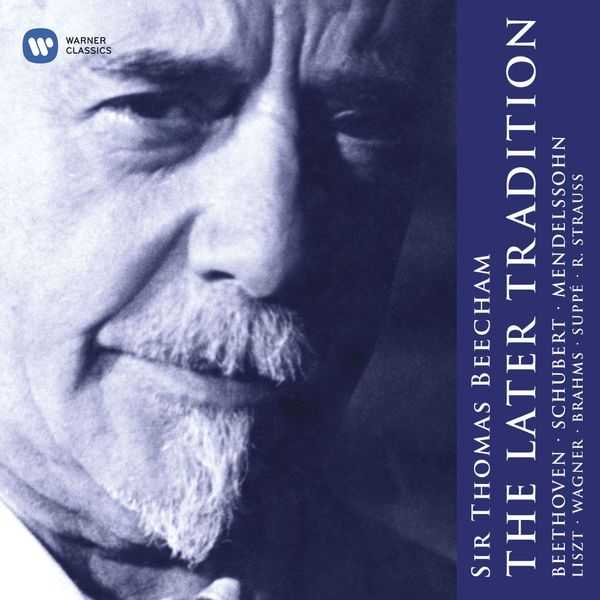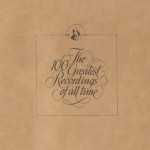
Composer: Ludwig van Beethoven, Johannes Brahms, Ferencz Liszt, Felix Mendelssohn, Franz Peter Schubert, Richard Strauss, Franz von Suppe, Richard Wagner
Orchestra: Royal Philharmonic Orchestra
Conductor: Sir Thomas Beecham
Format: FLAC (tracks)
Label: Warner
Catalogue: 9186112
Release: 2011
Size: 2.48 GB
Recovery: +3%
Scan: cover
CD 01
Beethoven: Symphony No. 2 in D major, Op. 36
01. I. Adagio – Allegro con brio
02 .II. Larghetto
03. III. Scherzo (Allegro)
04. IV. Allegro molto
Beethoven: Symphony No. 7 in A major, Op. 92
05. I. Poco sostenuto – Vivace
06. II. Allegretto
07. III. Scherzo (Presto)
08. IV. Allegro con brio
CD 02
Beethoven: Mass in C major, Op. 86
01. I. Kyrie
02. II. Gloria
03. III. Credo
04. IV. Sanctus
05. V. Benedictus
06. VI. Agnus Dei
Beethoven: The Ruins of Athens – Incidental Music Op. 113
07. Overture (Andante con moto – Allegro, ma non troppo)
08. Chorus: Daughters of high-throned Zeus
09. Chorus of Dervishes
10. Turkish March
11. Chorus: Where freedom hath triumphed
12. March & Chorus: Twine ye garlands
CD 03
Brahms: Symphony No. 2 in D major, Op. 73
01. I. Allegro non troppo
02. II. Adagio non troppo
03. III. Allegretto grazioso (Quasi andantino) – Presto, ma non assai
04. IV. Allegro con spirito
05. Brahms: Schicksalslied, Op. 54
06. Brahms: Academic Festival Overture, Op. 80
CD 04
Liszt: A Faust Symphony, S108
01. I. Faust (Lento assai – Allegro impetuoso – Allegro agitato ed appassionato assai)
02 .II. Gretchen (Andante soave)
03. III. Mephistopheles (Words by Goethe: Allegro vivace ironico – Andante mistico [Apotheosis])
CD 05
Mendelssohn: A Midsummer Night’s Dream Opp. 21 and 61
01. Overture, Op. 21
02. Mendelssohn: The Fair Melusine Overture, Op. 32
03. Liszt: Orpheus, symphonic poem No. 4, S98
Liszt: Psalm XIII S13
04. Lord, how long / Herr wir lange (Andante maestoso)
05. Look on me / Schaue doch (Andante mosso)
06. But I have trusted / Ich aber hoffe (Allegro moderato, ma non troppo)
07. I will to God / Ich wil dem Herrn (Allegro energico)
Wagner: Die Meistersinger von Nürnberg
08. Vorspiel (Prelude), 1. Aufzug
Suppe: Dichter und Bauer
09. Overture
CD 06
Schubert: Symphony No. 3 in D major, D200
01. First movement: Adagio maestoso – Allegro con brio
02. Second movement: Allegretto
03. Third movement: Menuetto (Vivace) & Trio
04. Fourth movement: Presto vivace
Schubert: Symphony No. 5 in B flat major, D485
05. I. Allegro
06. II. Andante con moto
07. III. Menuetto (Allegro molto) & Trio
08. IV. Allegro vivace
Schubert: Symphony No. 6 in C major, D589
09. First movement: Adagio – Allegretto
10. Second movement: Andante
11. Third movement: Scherzo (Presto) & Trio
12. Fourth movement: Allegro moderato
CD 07
Strauss: Don Quixote, Op. 35
01. Introduktion : Mäßiges Zeitmaß
02. Thema: Mäßig – The Knight of the Mournful Countenance
03. Variation I: Gemächlich – The adventure of the windmills
04. Variation II: Kriegerisch – The battle with the sheep
05. Variation III: Mäßiges Zeitmaß – Dialogue of Knight and Squire
06. Variation IV: Etwas breiter – The adventure with the procession of penitents
07. Variation V: Sehr langsam – Don Quixote’s vigil
08. Variation VI: Schnell – Dulcinea’s enchantment
09. Variation VII: Ein wenig ruhiger als vorher – The ride through the air
10. Variation VIII: Gamächlich – The adventure of the enchanted boat
11. Variation IX: Schnell und stürmisch – The battle with the enchanters
12. Variation X: Viel breiter – Don Quixote’s defeat and journey home
13. Finale: Sehr ruhig – The death of Don Quixote
Strauss: Le Bourgeois Gentilhomme, Op. 60
14. Overtüre (Overture, Act 1)
15. Menuett
16. Der Fechmeister (The Fencing Master)
17. Auftritt und Tanz der Schneider (Entrance and Dance of Tailors)
18. Das Menuett des Lully (Minuet of Lully)
19. Intermezzo (Prelude to Act II)
20. Das Diner (The Dinner)
CD 08
Strauss: Ein Heldenleben, Op. 40
01. Der Held (The Hero)
02. Des Helden Widersacher (His Adversaries)
03. Des Helden Gefährtin (His Companion)
04. Des Helden Walstatt (His Battlefield)
05. Des Helden Friedenswerke (His Peaceful Labours)
06. Des Helden Weltflucht und Vollendung (His Retirement and Life’s Fulfilment)
07. Entsagung (Renunciation)
08. Strauss: Feuersnot: Love Scene
Strauss: Intermezzo, Op. 72
09. Entr’acte in A flat
10. Strauss: Salome: Dance of the Seven Veils
sir-thomas-beecham-the-later-tradition-02.rar – 312.9 MB
sir-thomas-beecham-the-later-tradition-03.rar – 315.3 MB
sir-thomas-beecham-the-later-tradition-04.rar – 300.3 MB
sir-thomas-beecham-the-later-tradition-05.rar – 381.6 MB
sir-thomas-beecham-the-later-tradition-06.rar – 412.9 MB
sir-thomas-beecham-the-later-tradition-07.rar – 243.8 MB
sir-thomas-beecham-the-later-tradition-08.rar – 310.1 MB
There can be few, if any, musicians who have singlehandedly done so much in the establishment of resources for musical performance than Sir Thomas Beecham.
During WWI he conducted and supported financially both the Hallé and London Symphony Orchestras and the Royal Philharmonic Society. In 1915 he formed the Beecham Opera Company which trained many young British singers in this field. Eight years later this became the British National Opera Company and was absorbed into Covent Garden in 1932 when Beecham returned to be its Musical Director.
To quote David Cairns “We are nationally and individually a more musically aware people because of him and what he gave us”. A forceful statement, true, but whose life could ever challenge it?
Dissatisfied by conditions and practices, notably the supply of deputies for rehearsals, prevalent in British orchestras, he formed the London Philharmonic Orchestra that same year. Beecham was now able to be at the fulcrum of all developments in music in Britain. WWII put an end to this halcyon period. With Covent Garden shut he travelled, primarily in America, and did not return to Britain until 1944. The London Philharmonic had now become a self-governing body so Beecham, then aged 67, launched the Royal Philharmonic Orchestra. This was the orchestra with which he committed to disc so many classic recordings with which EMI Classics marks the 50th anniversary of his passing.
It is true that Beecham had particular favourites in composers – Haydn, Mozart, Schubert, Berlioz, Bizet and Puccini spring immediately to mind; also his love for Handel – even though his performances were always BIG-scale! He was an early champion of Richard Strauss and became a most effective exponent of Sibelius. His name will always be inextricably linked with that of Delius whose music Beecham seemed to know better even than the composer and it is appropriate that they are buried not far apart in the graveyard at St. Peter’s Parish Church, Limpsfield, Surrey.
He was knighted in 1916, the year he succeeded to his father’s baronetcy, and made a Companion of Honour in 1957.This affable, brilliant, usually charming, ever-communicative, quick-witted – even, at times, to the point of cruelty, dedicated conductor was also the most gifted executive musician England has ever produced.
He was fortunate that his grandfather, a chemist, had created the highly successful pharmaceutical manufacturing business which bore his name. His father, who had started in the company whilst still a teenager, was also fond of music so he was prepared to fund his son’s enthusiastic appetite to attend operas and concerts both here and abroad.
Born on 29th April 1879 in St. Helens, he attended public school at Rossall where his talent at the piano became a legend (the only boy ever to have been allowed a grand piano in his study!). From there he briefly attended Oxford (Wadham) but the composition classes, with Charles Wood in London and Moszkowski in Paris, were funded privately. As a conductor he was purely self-taught.
He formed an orchestra in his home town and deputised for Richter at a Hallé concert when his father was mayor. His career path was clear: he would use his financial resources to support the art which he enjoyed with the aim of bringing it to as many as possible.
At the age of 30 he launched the Beecham Symphony Orchestra, all young and carefully chosen. They would tour, play for opera and ballet and give concerts of adventurous music. London duly welcomed him for a season of intensive opera performances and over the next three years introduced many new ones to British audiences, including by Strauss, Delius and the Russians. He also brought Diaghilev’s Ballets Russes starring Nijinsky and Karsavina to the British stage.


